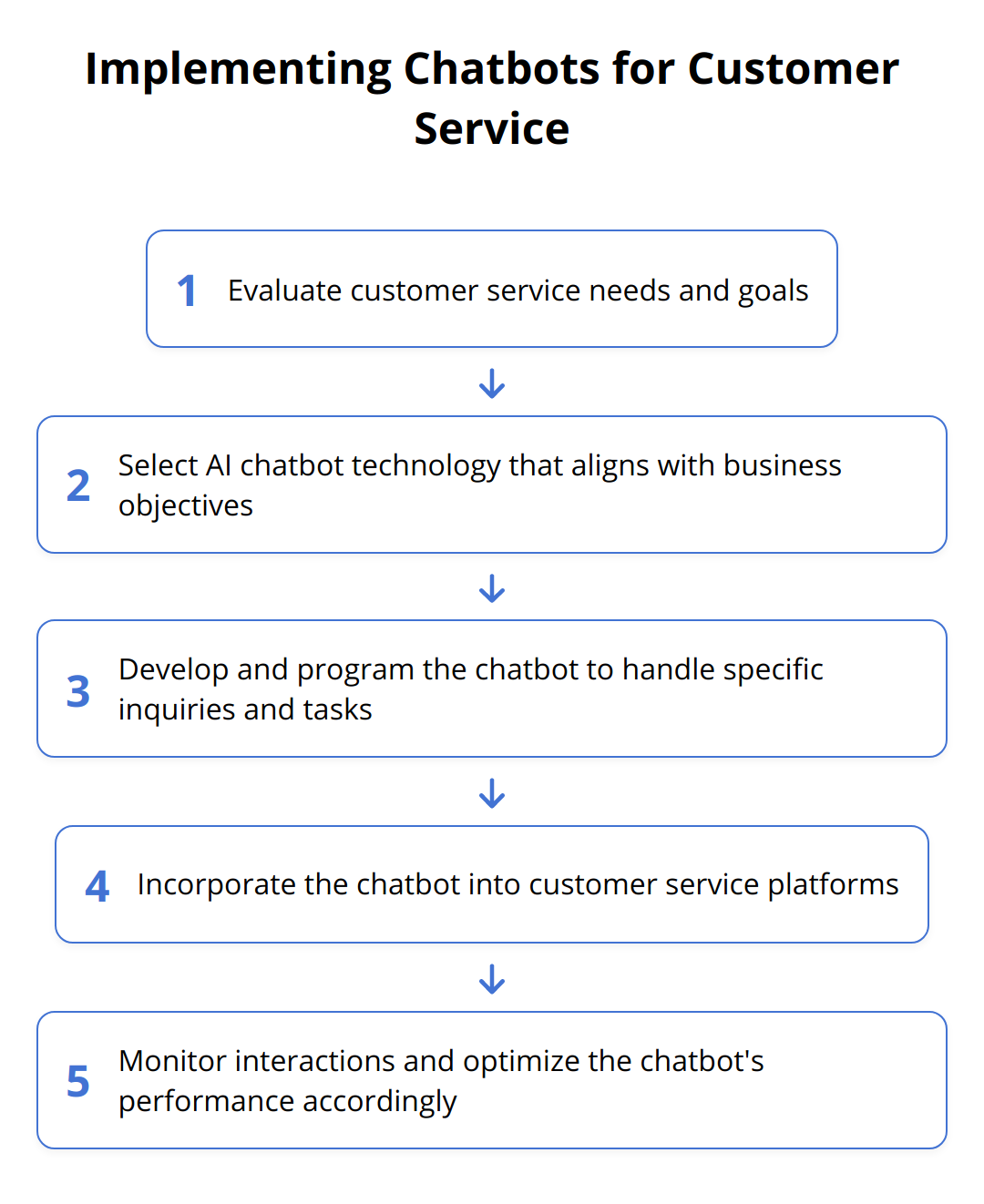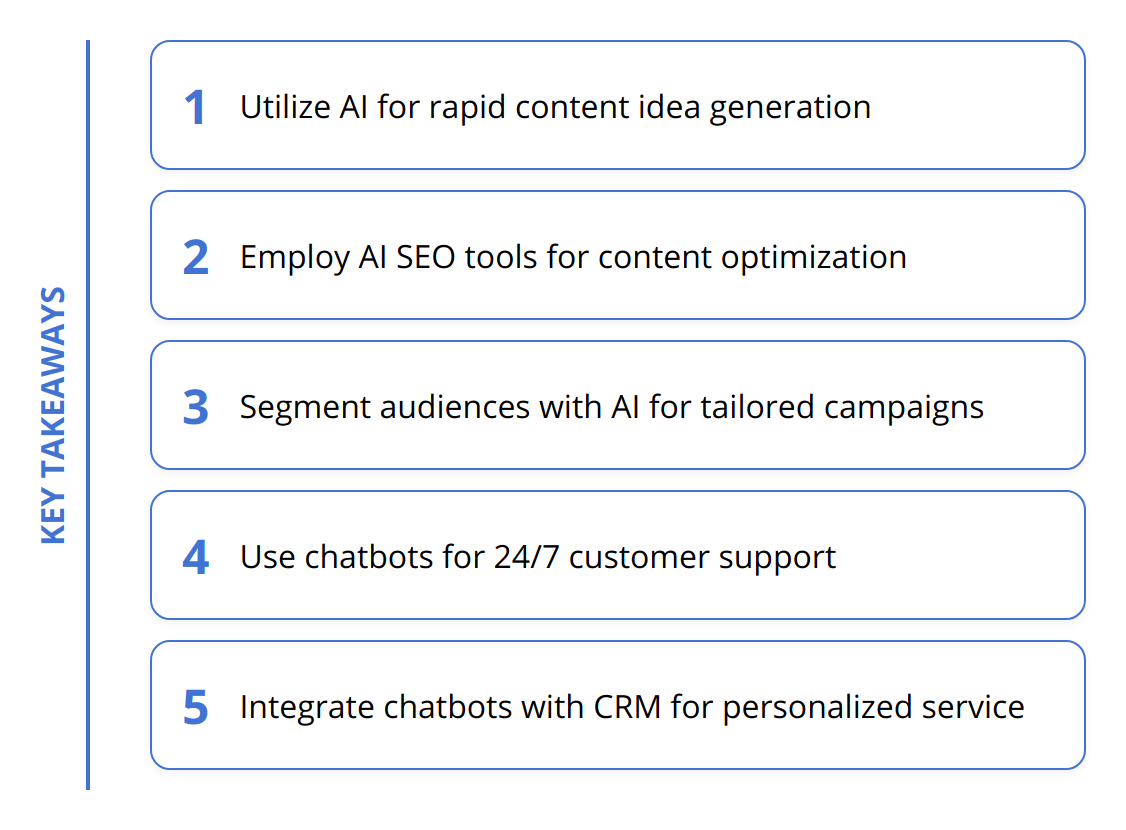We at Emplibot understand that the digital marketing landscape is constantly evolving with technology at its core. The seamless integration of AI tools has transformed how strategies are crafted and implemented.
Exploiting cutting-edge AI applications, marketers can now fuel their creative processes, dissect complex data for sharper customer insights, and turbocharge customer engagement like never before. Join us as we explore practical ways to harness the power of AI in the realm of digital marketing.
Power up Content with AI
The buzz around AI for digital marketing is warranted, especially when discussing content creation. Content is king, and AI is like the power behind the throne, ensuring that everything runs smoothly and effectively. Here’s how.
Firstly, generating blog ideas and headlines can be a daunting task, often requiring copious amounts of research and brainstorming. AI tools can analyze search trends, social media conversations, and performance data of existing content to suggest topics that are current, relevant, and more likely to engage your target audience. Take, for example, BuzzSumo – an AI-powered tool that offers deep insights into content trends and can suggest potential headlines that are crafted to capture attention. With AI, what used to take hours can now be condensed into a few clicks.
When it comes to optimizing content for search engines, AI is indispensable. Tools like Clearscope or Surfer SEO process vast datasets to provide recommendations on keywords, readability, and other SEO factors in real time. This ensures that your content is not just resonant with readers but also ranks well on search engine results pages (SERPs). Remember, optimizing content for SEO isn’t just a one-time task. It’s a continuous effort, and with AI, you’re better equipped to stay ahead of the game.

Creating personalized content experiences is critical in a world that’s brimming with generic messages. AI shines by leveraging user data and behavior to deliver content that hits the right notes with individual users. For instance, if you’re into email marketing, tools like Mailchimp use AI-driven insights to segment audiences and tailor content that drives engagement. Personalization at scale was once a marketer’s pipe dream, but with AI, it’s the norm.

Here are a few additional prompts to bring AI into your content creation strategy effectively:
-
Use data insights aggressively. Dive into AI-generated reports to understand what works and iterate rapidly.
-
Test different AI tools to find the best fit for your needs. Not all tools are created equal.
-
Always prioritize user experience when leveraging AI for personalization. The aim is to provide value, not overwhelm.
-
Educate your team regarding the potentials and limitations of AI in content creation.
By making content smarter with AI, not only does efficiency skyrocket, but the connections made with audiences can become more meaningful, driving better results for any digital marketing strategy. And if you’re looking to get more actionable insights on AI-driven content strategies, the guide on AI-driven content strategies provides practical tips that you shouldn’t ignore.
Harnessing AI for Customer Insights
Unlocking the potential of AI for data analysis and extracting valuable customer insights is an absolute game-changer for digital marketers. It’s all about understanding the subtleties and nuances of customer behavior, fine-tuning audience segmentation, and accurately measuring the impact of marketing campaigns.

Predictive analytics tools are essential in anticipating future actions of consumers based on their past behavior. For instance, by analyzing purchase history and engagement data, AI can forecast which customers are most likely to respond to a new promotion or product launch. Platforms such as Google Analytics use predictive modeling to identify possible customer outcomes, empowering marketers to act preemptively. This foresight is pivotal for crafting strategies that speak directly to consumer needs and trends.
Audience segmentation has evolved beyond simple demographic splits. Today’s AI-driven tools categorize consumers based on a multitude of factors including previous interactions, buying habits, and personal preferences. These dynamic segmentation models allow marketers to create incredibly targeted campaigns that resonate on a personal level. Companies like Salesforce harness the power of AI to segment audiences more effectively, which in turn enhances engagement and conversion rates significantly.
Measuring campaign performance is equally critical and AI excels at providing granular insights here. Advanced tracking systems not only evaluate the direct response to campaigns but also assess long-term effects on brand perception and customer lifetime value. AI algorithms analyze data from multiple touchpoints, processing information far beyond human capability to extract actionable insights. This depth of analysis ensures that marketers can confidently allocate budgets to the most effective tactics.

Marketers should:
-
Incorporate AI for more accurate prediction of customer behavior.
-
Keep refining your audience segmentation tools. It’s a continuous process.
-
Use AI tools that provide comprehensive reports for measuring campaign performance.
By tapping into these sophisticated AI capabilities, marketers can ensure that each campaign is smarter, more effective, and more personalized, directly contributing to a stronger bottom line. If you’re interested in further understanding the complexities of audience segmentation, the guide on predictive customer segmentation offers clear, actionable insights.
Boost Engagement with AI Chatbots
In the bustling world of digital marketing, one innovation that has significantly improved customer engagement are AI chatbots. These chatbots are not just a fancy feature; they’re a powerhouse in providing real-time assistance, leading to increased customer satisfaction and loyalty.
Around-the-clock support is a non-negotiable in today’s market. Customers expect answers at their fingertips, whether it’s midnight or midday. AI chatbots deliver this support tirelessly, ensuring no customer is left waiting. For example, the hospitality industry has seen a surge in satisfaction by implementing chatbot solutions for instant responses to guest inquiries.

Simultaneously handling numerous conversations is another feather in the chatbot cap. Unlike human agents who have limits, AI chatbots can engage with countless customers at once, scaling service capabilities exponentially. Retailers have reported, via case studies, that implementing chatbots for customer interactions cuts down the wait time and increases the opportunity to serve more customers, leading to improved sales.
Consistency is key in maintaining brand voice and customer service quality. AI chatbots deliver this with precision, offering uniform communication across various channels like websites, social media platforms, or customer service portals. This unified approach ensures that customers receive the same level of service no matter where they reach out which can significantly raise brand reliability and trust.
However, the utility of chatbots goes beyond these aspects. Here are meaningful ways to implement AI chatbots for better customer engagement:
-
Foster a feedback-oriented approach: Use chatbots to collect instant feedback after interactions, making customers feel heard and providing vital data for service enhancement.
-
Integrate with CRM systems: Connect your chatbot to your customer data platform to personalize conversations based on customer history and preferences.
-
Craft a knowledge base: Equip your chatbot with a comprehensive knowledge base to resolve queries effectively and reduce the need for human intervention.
-
Monitor and Iterate: Constantly analyze chatbot interactions for insights into customer needs and tweak the bot’s responses for better performance.
To sum it up, AI chatbots are transforming customer engagement by providing swift, consistent, and personalized interactions. By leveraging these tools effectively, marketers can not only meet but exceed customer expectations, creating a competitive edge and fostering lasting customer relationships. If you’re ready to take your chatbot strategy up a notch, comprehensive insights on enhancing chatbots for better conversions can be found in our chatbot conversion strategies guide.
Wrapping Up
The transformative power of AI in digital marketing is undeniable. As we’ve explored, from generating compelling content to unlocking deep customer insights and enhancing engagement with AI chatbots, the applications are wide-reaching. AI tools empower marketers to strategize with precision, elevate the user experience and drive campaigns that yield real results.

The balance between automated solutions and the human touch is at the forefront of these innovations. While AI enables efficiency and data-driven decision making, the creativity and emotional intelligence inherent in human marketers play a pivotal role. It’s this synergy of man and machine that culminates in the most dynamic marketing strategies.
Marketers are encouraged to embrace AI tools judiciously. They must ensure that the technology serves the brand’s purpose, aligns with business goals, and, most importantly, meets customer needs. Wise integration of AI in digital marketing encompasses the following:
-
Choosing AI solutions that complement the team’s skills
-
Setting clear objectives for AI implementations
-
Monitoring AI performance and making adjustments as necessary
-
Maintaining a customer-centric approach throughout
Emplibot is at the vanguard of these exciting developments, offering businesses the ability to build their blog 100% automatically, from keyword research to internal linking. With Emplibot, the effort of maintaining an SEO-friendly WordPress site is not just reduced; it’s completely revolutionized.
In the end, the efficacy of using AI in digital marketing is clear. Marketers ready to harness these tools are setting themselves up for a future where success isn’t just about working harder, but smarter. To take a step toward automated blogging excellence, consider exploring Emplibot.
For those ready to make AI an integral part of their digital marketing toolkit, embracing the right tools can make all the difference in crafting a winning strategy.

